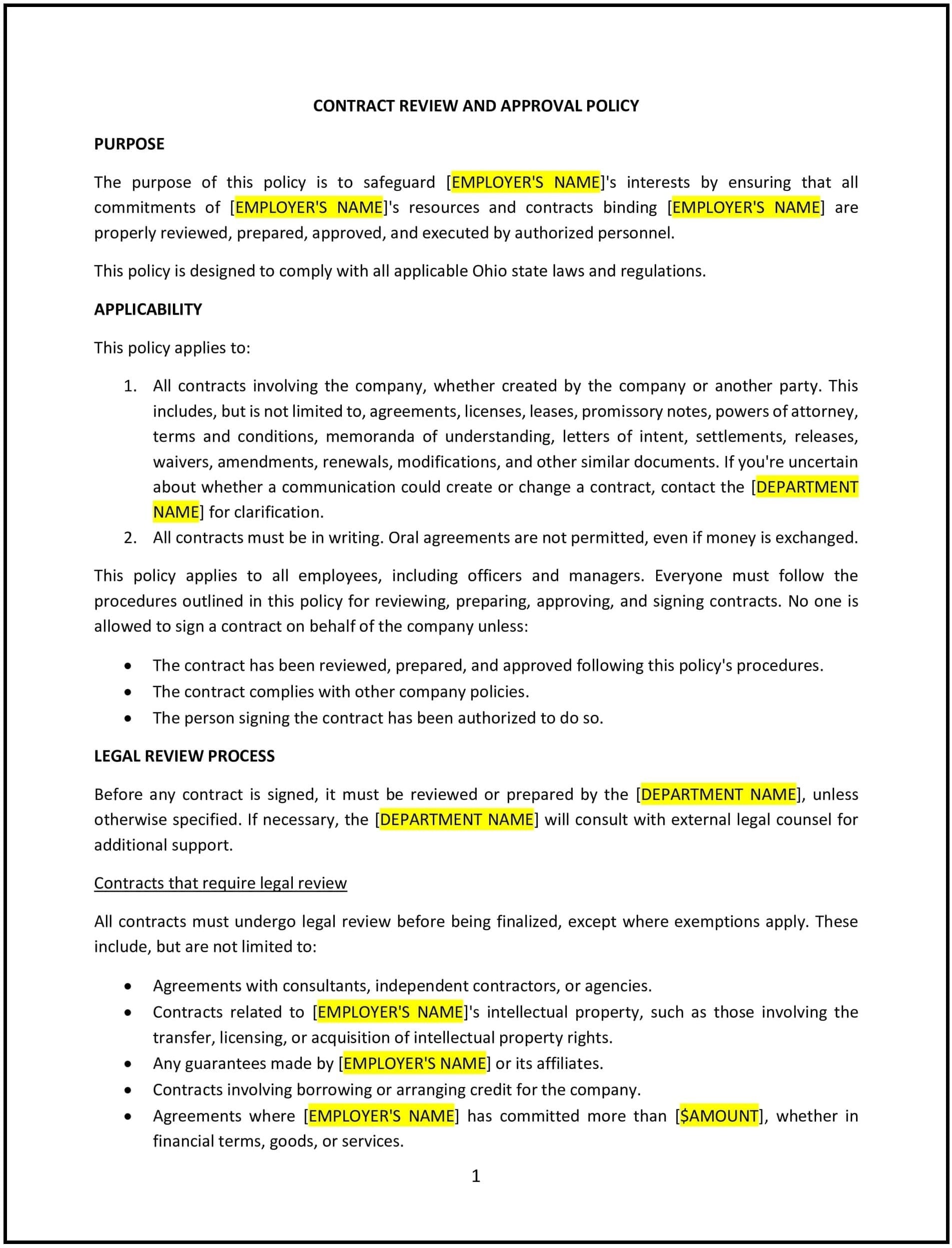Contract review and approval policy (Ohio): Free template
Got contracts to review? While you're here for policies, let Cobrief make contract review effortless—start your free review now.

Customize this template for free
Contract review and approval policy (Ohio)
A contract review and approval policy sets forth the procedures for Ohio businesses to follow when reviewing, approving, and executing contracts. This policy establishes clear guidelines for ensuring that all contracts entered into by the business comply with legal, financial, and operational standards. It specifies the roles and responsibilities of employees involved in the contract process, the steps for reviewing contracts, and the necessary approval process before finalizing any agreements. The policy aims to minimize legal risks, ensure compliance with Ohio state laws, and align contracts with the company’s strategic goals.
By implementing this policy, Ohio businesses can streamline their contract management process, reduce legal exposure, and ensure that all contractual obligations are clearly defined and well-understood by all parties involved.
How to use this contract review and approval policy (Ohio)
- Define contract types and categories: The policy should outline the different types of contracts the business regularly enters into (e.g., vendor contracts, customer agreements, employee contracts) and categorize them based on complexity, risk level, and financial impact. This will help determine the appropriate level of review required for each contract.
- Establish review procedures: The policy should specify the process for reviewing contracts, including who is responsible for conducting the review (e.g., legal department, procurement team, or specific managers). The review process should involve checking for compliance with Ohio state laws, business objectives, and risk management guidelines.
- Outline approval hierarchy: Clearly define the chain of approval for contracts. For example, low-value contracts may require approval from a department head, while high-value or high-risk contracts may need approval from senior management or legal counsel.
- Define timelines for review: Set specific timelines for how long each stage of the contract review process should take to ensure that contracts are processed efficiently without unnecessary delays.
- Ensure compliance with Ohio state laws: The policy should require that all contracts comply with Ohio state laws and federal regulations, including those related to labor, privacy, and consumer protection.
- Address negotiation and amendments: The policy should specify the process for negotiating contract terms and making amendments or modifications to existing contracts. This ensures consistency and clarity in the terms agreed upon by both parties.
- Use standardized contract templates: Whenever possible, the policy should encourage the use of standardized contract templates to streamline the review process and ensure consistency in terms and conditions across the business.
- Monitor contract execution and performance: After approval, the policy should include procedures for monitoring the execution of contracts and tracking compliance with the terms agreed upon. This includes ensuring that both parties meet their obligations as outlined in the contract.
- Regularly review and update the policy: The policy should be reviewed periodically to ensure that it remains in line with Ohio state laws, business objectives, and industry best practices for contract management.
Benefits of using this contract review and approval policy (Ohio)
This policy provides several key benefits for Ohio businesses:
- Reduces legal risks: By ensuring that all contracts are properly reviewed and approved, the business can minimize the risk of entering into agreements that are unenforceable or that expose the business to unnecessary liability.
- Streamlines the contract process: A clear review and approval process allows for faster contract negotiations and reduces the time spent on administrative tasks, improving overall efficiency.
- Enhances compliance: The policy ensures that contracts are in compliance with Ohio state laws, industry standards, and internal business policies, which helps avoid legal disputes or regulatory penalties.
- Promotes accountability: The policy sets clear roles and responsibilities for reviewing and approving contracts, fostering accountability among employees and managers involved in the process.
- Improves contract quality: By using standardized templates and a consistent review process, businesses can ensure that contracts are clear, comprehensive, and aligned with business goals.
- Supports strategic decision-making: With clear guidelines for reviewing and approving contracts, businesses can make more informed decisions that align with their strategic objectives and risk management priorities.
- Protects the business’s reputation: Ensuring that all contracts are thoroughly reviewed and approved helps protect the company’s reputation by preventing disputes, misunderstandings, or breaches of contract.
Tips for using this contract review and approval policy (Ohio)
- Communicate the policy clearly: Ensure that all employees involved in the contract process understand the policy by including it in the employee handbook and providing training on contract management procedures.
- Use standardized contract templates: Encourage the use of standardized templates to save time and ensure consistency in contract terms. Templates should be reviewed periodically to ensure they remain relevant and up to date with Ohio state laws.
- Designate responsible parties: Clearly designate which employees or departments are responsible for reviewing and approving contracts, and ensure they have the expertise and resources to do so effectively.
- Establish clear timelines: Set realistic timelines for each stage of the contract process, ensuring that contracts are reviewed and approved in a timely manner to prevent unnecessary delays.
- Provide legal oversight: Ensure that all contracts, particularly those involving complex terms or high-value agreements, are reviewed by legal counsel to ensure compliance with applicable laws and regulations.
- Monitor contract performance: After contracts are executed, ensure that there are procedures in place for monitoring compliance with contract terms and resolving any issues that may arise during the contract’s execution.
- Review and update regularly: Periodically review and update the policy to reflect changes in Ohio state laws, business needs, and best practices for contract management.